Food safety is of paramount importance to public health and consumer confidence. In response to the growing concerns over foodborne illnesses and contamination incidents, the United States Congress passed the Food Safety Modernization Act (FSMA) in 2011. This landmark legislation aimed to revolutionize the nation’s food safety system by shifting the focus from reactive measures to proactive prevention.
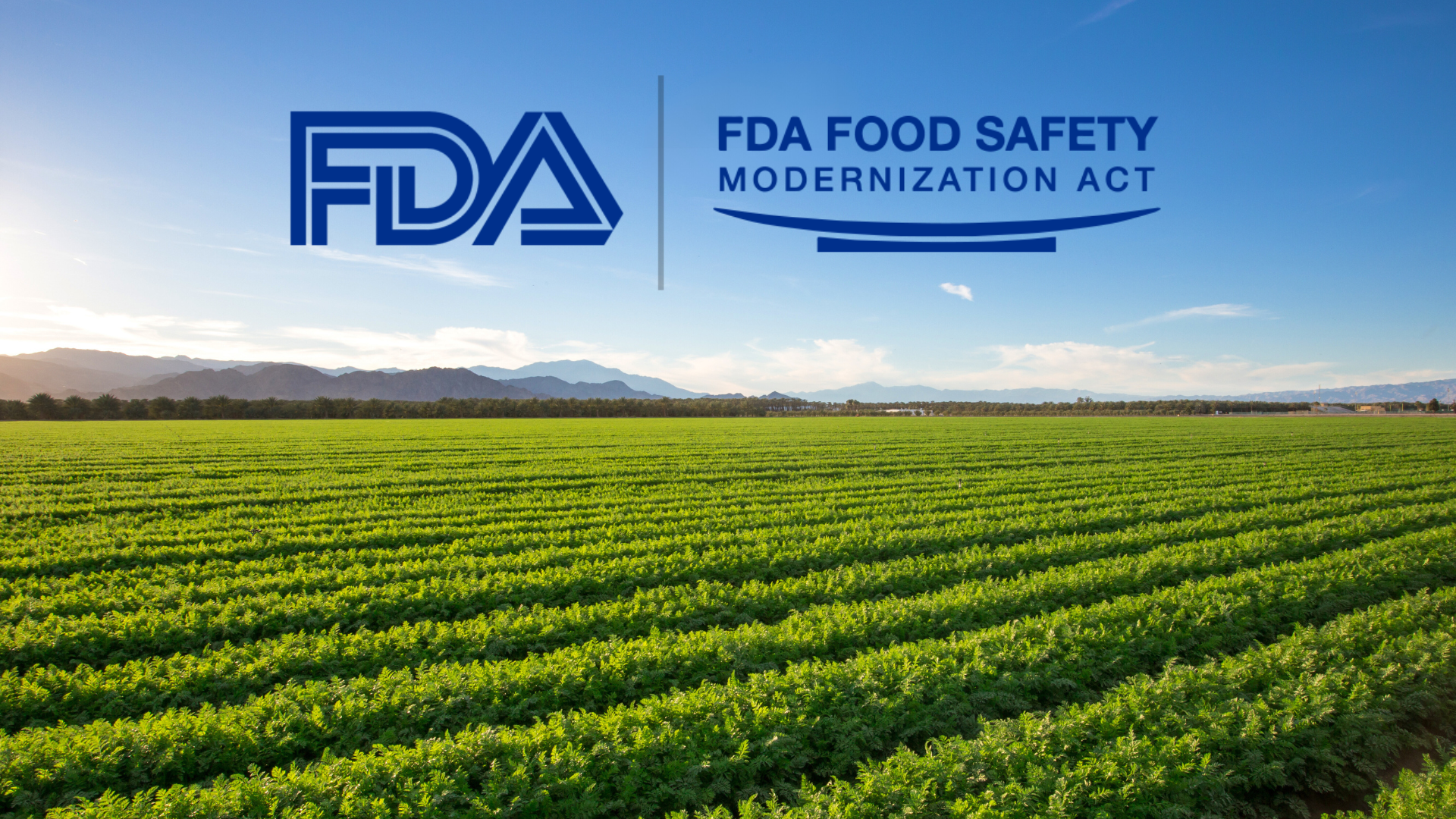
The FDA’s Food Traceability Final Rule establishes new traceability recordkeeping requirements for certain foods on the Food Traceability List (FTL). It applies to those involved in manufacturing, processing, packing, or holding these foods and aims to implement Section 204(d) of the FDA Food Safety Modernization Act (FSMA). The rule requires maintaining records with Key Data Elements (KDEs) related to Critical Tracking Events (CTEs) and providing information to the FDA within 24 hours or an agreed reasonable time.
Key provisions of the final rule on Requirements for Additional Traceability Records for Certain Foods (Food Traceability Final Rule) establishes traceability recordkeeping requirements, beyond those in existing regulations, it includes:
- Identification of Critical Tracking Events (CTEs): The rule identified specific points in the supply chain that are crucial for tracing the movement of food products. These CTEs could include growing, receiving, transforming, creating, and shipping events, depending on the type of food and its production process.
- Traceability Data Elements: The FDA specified the information that food facilities would be required to capture and maintain for each CTE. These data elements included information about the food product, its packaging, the facility, and the immediate previous source and subsequent recipient in the supply chain.
- Recordkeeping Requirements: The proposed rule mandated that the responsible parties in the supply chain maintain accurate and accessible records related to the identified CTEs. This was crucial for facilitating rapid and accurate tracebacks during foodborne illness outbreaks or contamination events.
- Applicability: The rule focused on certain foods that were identified as having a higher risk of causing foodborne illness, such as leafy greens, tomatoes, cucumbers, melons, and shell eggs. The scope was intended to cover both domestically produced and imported food products.
The goal is to enable faster identification and removal of potentially contaminated food, reducing foodborne illnesses and deaths. The rule aligns with industry best practices and covers both domestic and foreign firms in the food supply chain. All entities subject to the rule must comply by January 20, 2026.
DiMuto is a company that specializes in providing digital solutions for supply chain traceability and visibility in the AgriFood industry. With the introduction of the United States Food Safety Modernization Act (FSMA) and the FDA’s Food Traceability Final Rule, AgriFood companies need to comply with new traceability recordkeeping requirements to ensure food safety and meet regulatory standards. DiMuto can play a crucial role in helping these companies achieve compliance with the Food Traceability Final Rule in the following ways:
1. Digitized Traceability:
DiMuto offers a digital platform that allows AgriFood companies to capture and store traceability data elements as required by the rule. The platform can efficiently record critical tracking events (CTEs) in the supply chain, such as growing, receiving, transforming, creating, and shipping events. This digitization ensures accurate and accessible records are maintained for each CTE, making it easier for companies to demonstrate compliance during audits and inspections. All this information is recorded and automatically collated for every single product order and carton on the platform, linking to unique QR codes on each carton.
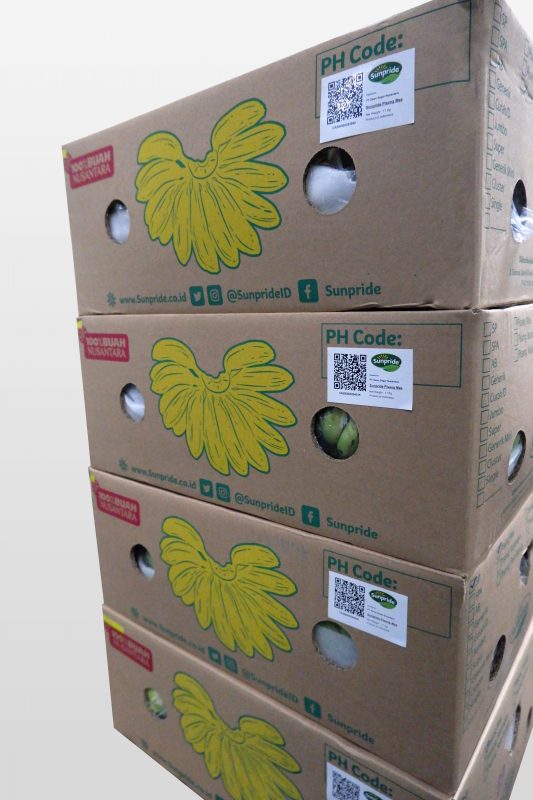
2. Data Management:
The platform provided by DiMuto can manage and store traceability data in a centralized system. This helps companies maintain accurate and up-to-date records, which is essential for facilitating rapid and accurate tracebacks in the event of foodborne illness outbreaks or contamination incidents. The ability to quickly identify the source of potentially contaminated food is critical for preventing the spread of illnesses and removing unsafe products from the market. With our Quick Scan, you can know the supply chain movement for each carton easily.
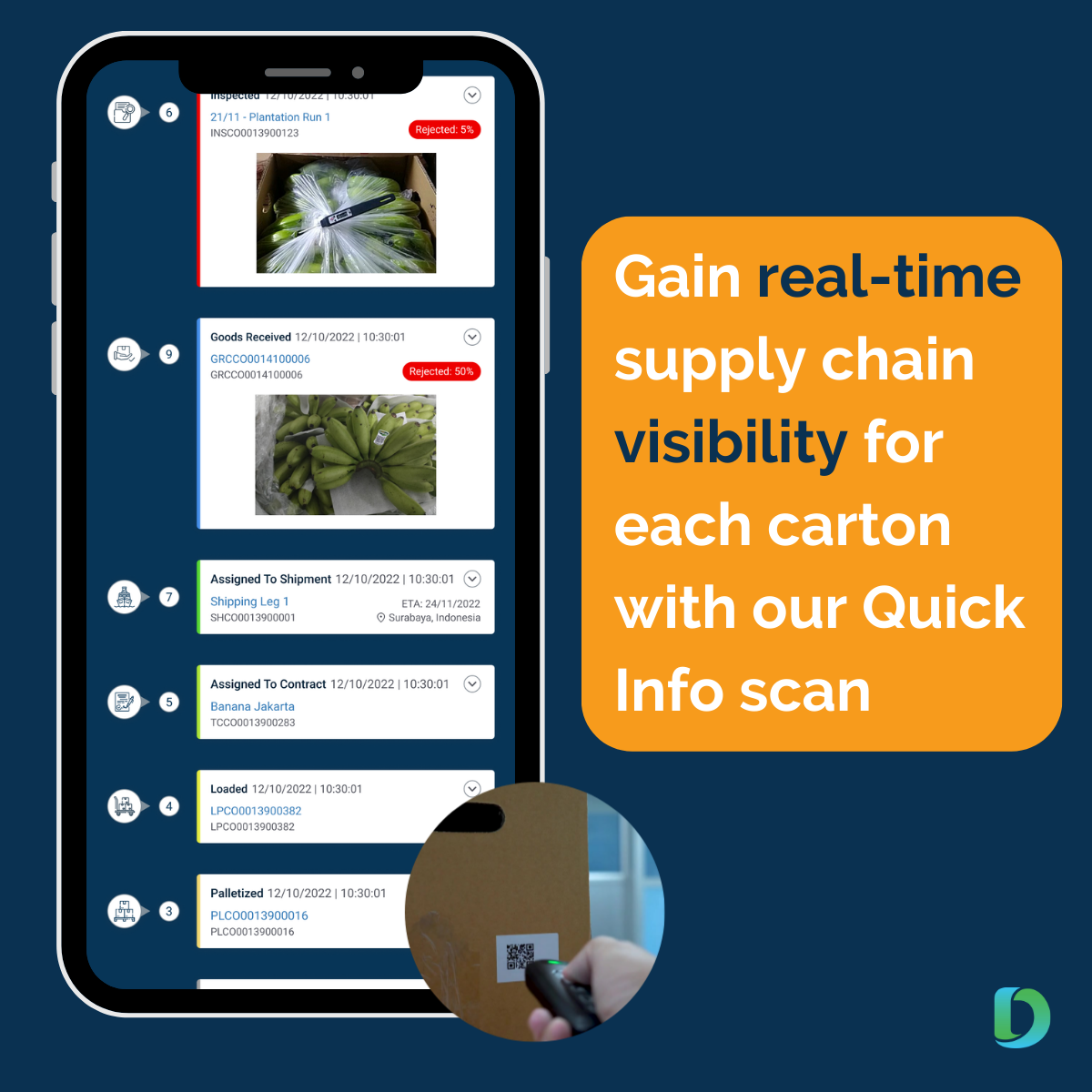
3. Automated Reporting:
DiMuto’s digital solution can generate automated reports, allowing companies to provide the required information to the FDA within 24 hours or an agreed reasonable time, as mandated by the Food Traceability Final Rule. The platform streamlines the reporting process, reducing manual efforts and ensuring timely compliance. Simply click to download the report PDF on our Platform and it will be sent to the relevant email.
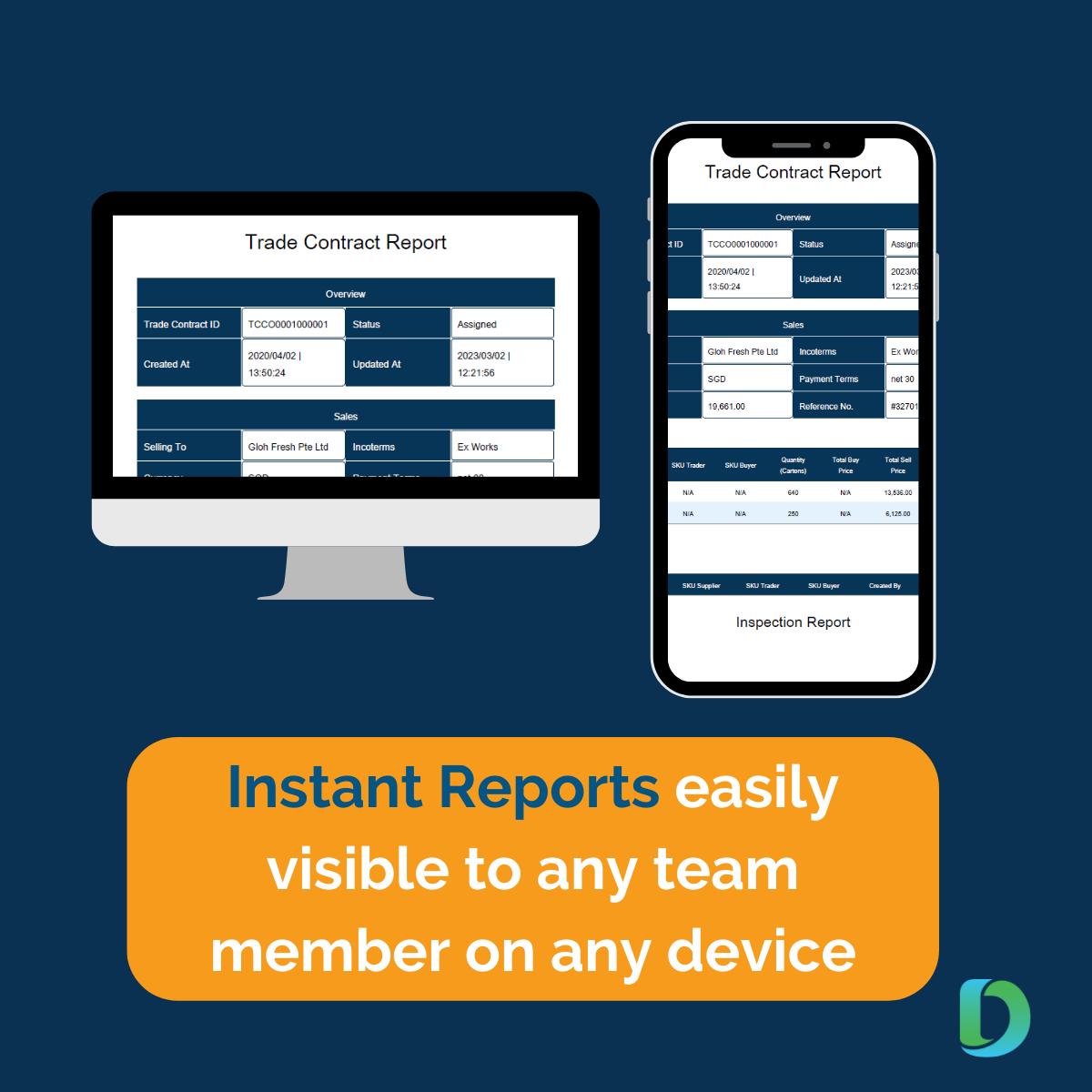
4. Specific Food Focus:
With SKU categories, DiMuto’s platform can be customized to focus on certain foods identified in the rule as having a higher risk of causing foodborne illnesses, such as leafy greens, tomatoes, cucumbers, melons, and shell eggs. This flexibility allows companies to tailor their traceability efforts to meet the specific requirements for these high-risk food products, and can better monitor Quality Standards with our Inspection Management.
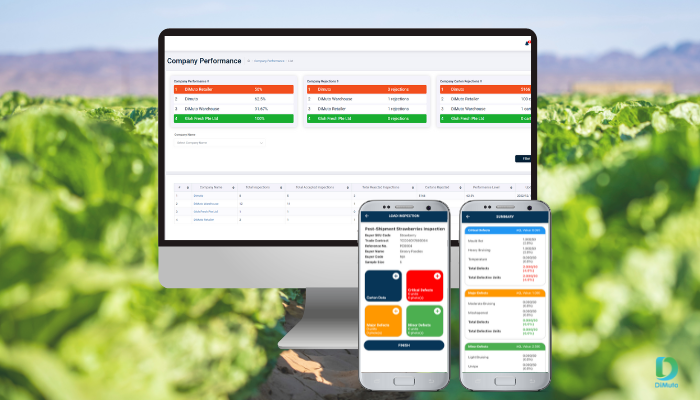
5. Global Supply Chain Coverage:
The Food Traceability Final Rule covers both domestically produced and imported food products. DiMuto’s Platform is capable of supporting supply chains of domestic and foreign firms, ensuring that all entities involved in the food supply chain can comply with the regulations.

6. Real-time Visibility:
DiMuto’s platform provides real-time visibility into the supply chain, enabling companies to track the movement of food products from farm to fork. This visibility enhances transparency and accountability in the supply chain, further contributing to food safety and compliance with the FSMA regulations.
Read more about our Trade Management tools here:
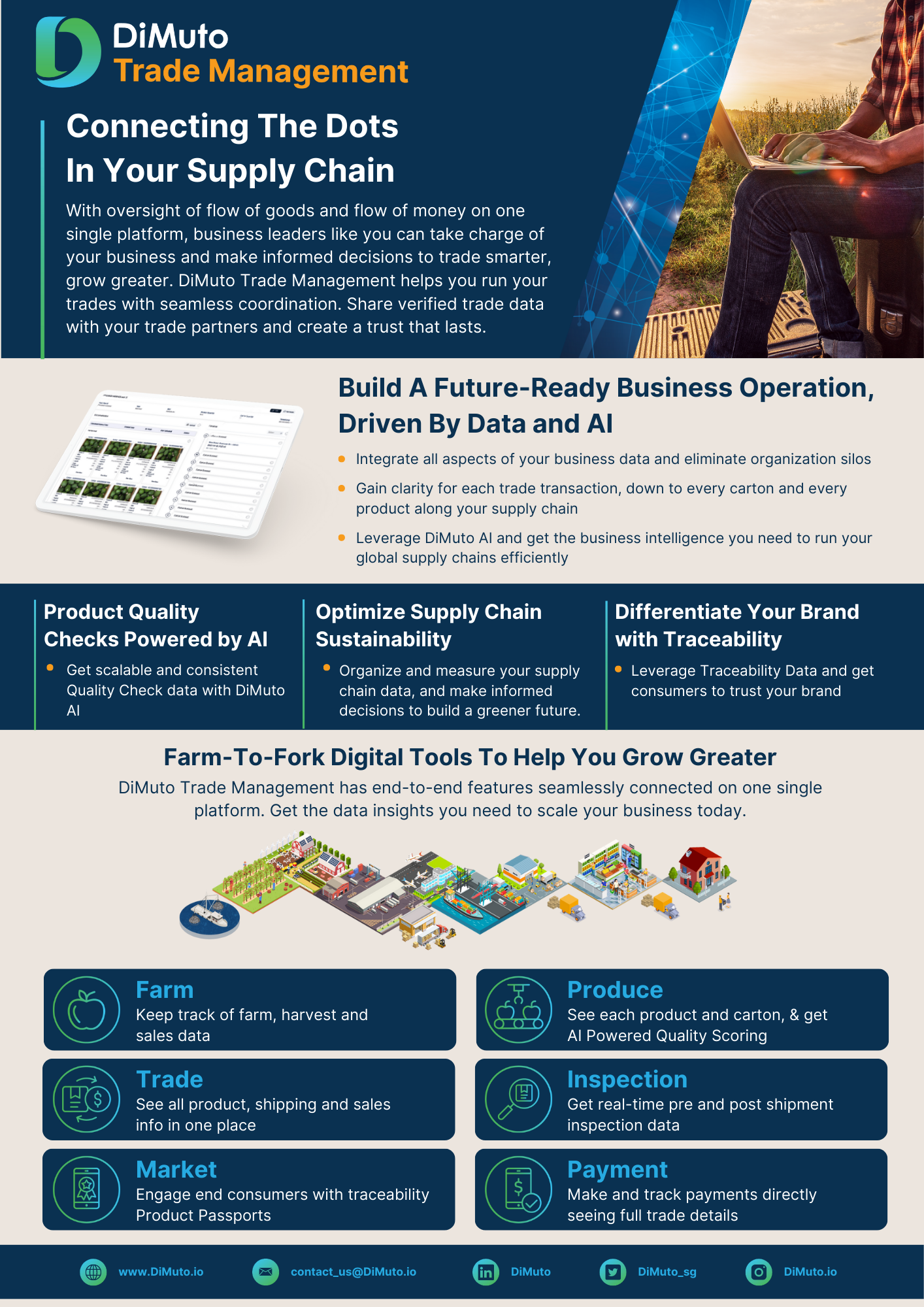
Overall, DiMuto’s digital traceability and supply chain visibility solutions can greatly assist AgriFood companies in complying with the Food Traceability Final Rule. By streamlining recordkeeping, automating reporting, and providing real-time visibility, DiMuto helps enhance food safety, reduce foodborne illnesses, and ensure regulatory compliance.


